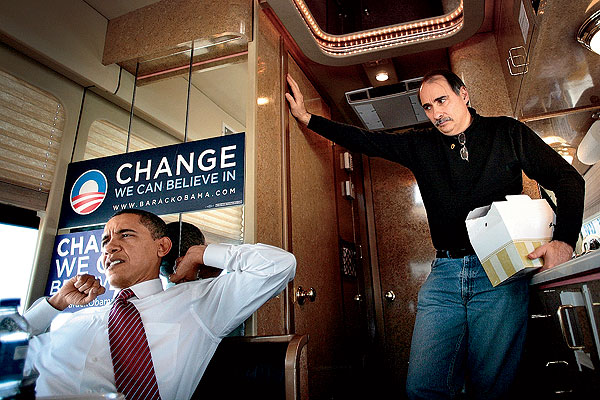
Related:
Q&A »
Axelrod on Chicago as the campaign HQ, what he misses about the West Wing, and more
HATCHET MAN: THE RISE OF DAVID AXELROD »
From the archives: our December 1987 profile
This month Daniel Libit profiled David Axelrod, who’s gearing up for the campaign that he says is the last one he has in him: the 2012 presidential election. Today that election got a lot harder, TPM’s Brian Beutler reports:
President Obama’s mid-session budget review confirms what most private and government projections have recently concluded — that the economy is considerably weaker than earlier forecasts held, and won’t fully recover from the Great Recession for years.
Most troubling, both for the country and for Obama politically, is that near-term unemployment is expected to remain significantly higher than expected, averaging 9 percent in fiscal year 2012.
I think most people who follow economic statistics at all closely, including laymen like me, have assumed that was going to be the case, since there hasn’t been much reason to expect otherwise recently coming out of the private sector and the signals from the White House and the Fed have been modest.
So perhaps it’s unsurprising that Axelrod is thinking of turning back the clock:
“I think what I’ve learned and what I want to continue to hone—in certain ways, it is something I have been thinking about since the midterm elections—is we really need to return to first principles,” Axelrod says. “Go back to the 2004 [Democratic National] Convention speech, and [Obama] was very eloquent about what it is that we’re after as Americans. And he’s working on how to tell that story in the midst of the [economic] storm here. We have two focuses: One is to recover from the recession, and the other is to restore the security of middle-class families. Explaining that—when we haven’t fully recovered from the recession and people are very much feeling that economic uncertainty in their own lives—is challenging. So I want to think more about how to make that case.”
To do so, Axelrod moved back:
To figure out that story, Axelrod knew he needed to escape the Beltway and reacquaint himself with the world in which voters live. He needed to get back to Chicago.
The latest data show things are looking downright ugly again, with July’s unemployment rate in Chicago at 11.7 percent–climbing back up to heights not seen since early 2010, when unemployment was 12.4 percent in January and 11.9 percent in February, according to data from the U.S. Bureau of Labor Statistics.
It’s quite a bit different from the capital that Axelrod just escaped, one of the few metro areas in the country that’s thriving (in some ways):
Talwar’s success — and that of hundreds of other contractors like her — is a key factor driving the explosion of the region’s wealth over the last two decades. It also has exacerbated the gap between high- and low-wage workers, which is wider in the D.C. area than almost anywhere else in the United States.
Washingtonians now enjoy the highest median household income of any metropolitan area in the country, and five of the top 10 jurisdictions in America — Loudoun, Howard and Fairfax counties, and Falls Church and Fairfax City — are here, census data shows.
In Great Falls, the burb profiled in that Post piece, the median income has increased by a third over the past decade. It’s not just a matter of the size of government, it’s also the centralization of its spoils in the greater DC area, as the piece’s figures on the rise in contractor spending demonstrate.
2012 will be a fascinating election for political junkies. With a difficult record to run on ("it would have been worse with anyone else" is a tough sell, not least because you’re running against a hypothetical), and a campaign persona predicated on being the "adult in the room" making it tough to attack a likely controversial Republican opponent, Axelrod will have to walk a very fine line. Which is why, I think, anyone cares about the otherwise-minor row over the scheduling and rescheduling of the President’s jobs-focused joint session. No, most people aren’t going to notice or remember a year from now, but the Obama campaign will be on such thin ice through next November that any misstep will inevitably be magnified.
It will, however, probably be pretty depressing for everyone else.
Photograph: Chicago Tribune


